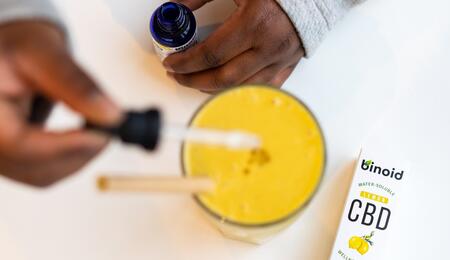New findings may make CBD treatment more effective

University of South Australia scientists have successfully formulated a potential solution that could enhance the efficacy of CBD when used to treat multiple sclerosis, epilepsy and other neurodegenerative diseases.
CBD is widely prescribed for many health conditions due to its alleged analgesic, anti-inflammatory, and neuroprotective properties. However, its clinical applications have been restricted by the product's poor water solubility and absorption by the human body.
By producing a class of lipids (fats) containing phosphorus – investigators have documented that they have successfully boosted the solubility of CBD by up to six times, improving its absorption in the body's gastrointestinal tract. This implies that patients could see more uniform and convincing results from lower doses of oral CBD medicines. As it currently stands only a slim fraction of orally ingested CBD makes it into the bloodstream, an issue which limits the cannabinoid'stherapeutic effects.
“For this reason, several different formulations have been explored, including the production of synthetic CBD, self-emulsifying delivery systems, and encapsulating CBD in gelatine matrix pellets, but all of them have only resulted in minor improvements in bioavailability,” -Lead experimenter Professor Sanjay Garg, in the International Journal of Molecular Sciences,
The research group pinpointed the optimal phospholipid arrangement to form nanosized CBD-PLC particles. In comparison to pure CBD, the phospholipid complex enhanced dissolution rates from 0% to 67.1% in the space of three hours. This demonstrated a substantial increase in drug release.
In further studies, CBD-PLC displayed 32.7% higher permeability than whole CBD, translating to more significant absorption via the intestinal wall.
Are there any other benefits of this delivery method of CBD?
Another crucial benefit of this new delivery method is its resilience. Standard CBD products have been found to degrade, reducing potency and shelf life as a result of exposure to light, oxygen and heat over time.
Nevertheless, testing over a year-long period revealed that CBD-PLC maintained its performance whilst kept in a variety of storage conditions, making it a more dependable option for medical products.
“Improved bioavailability means that lower doses can achieve the same therapeutic effect, potentially reducing side effects and making treatment more cost-effective,” Study’s first author, Thabata Muta.
The study team thinks that this technique could be useful beyond the scope of just CBD, delivering a blueprint for improving the absorption of inadequately water-soluble drugs.
Consequently, they are now examining the possibility of clinical trials to further research and validate the unique formulation.
More From Soft Secrets:
Report finds CBD Products to be Ineffective







